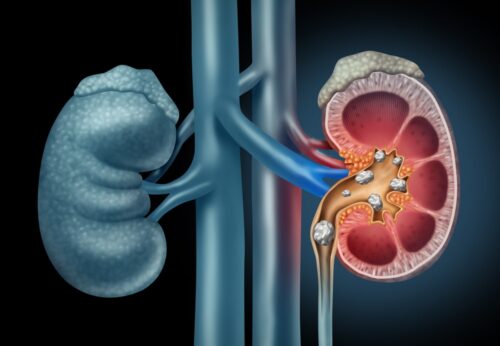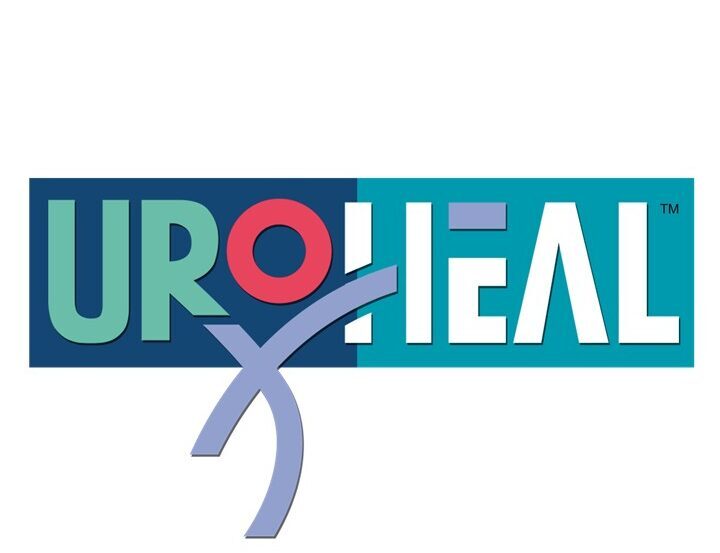Kidney Stones
Kidney Stones
Each year, more than half a million people go to emergency rooms for kidney stone problems. It is estimated that one in ten people will have a kidney stone at some time in their lives.
Our urine contains many dissolved minerals and salts. When the urine has high levels of these minerals and salts, it can form stones. Kidney stones can start small but can grow larger in size, even filling the entire inner hollow structures of the kidney. Some stones stay in the kidney, and do not cause any problems. Sometimes, the kidney stone can travel down the ureter, the tube between the kidney and the bladder. If the stone reaches the bladder, it can be passed out of the body thru the urethra. However if the stone becomes lodged in the ureter, it blocks the urine flow from that kidney and causes pain.

Frequently Asked Questions on Kidney Stones
How to know if I have kidney stones?
Many stones are detected without any apparent clinical symptoms during a routine ultrasound examination of the abdomen. The common clinical signs and symptoms are blood in the urine, recurrent urinary tract infections, the urge to urinate very often, mild back ache, loin pain. However the most dramatic is during passage of the stone down the ureter when the pain is excruciating and can radiate from the back to the groin.
What causes kidney stones?
Kidney stones can have multiple reasons including
- Diet
- Bowel conditions
- Obesity
- Medical conditions
- Inherited disorder
- Certain medication
- Family history
How kidney stones can be treated?
You could sometimes leave the stone alone and let it pass out on its own. Medications like uric acid lowering medications, urine alkalinizes and sometime alpha-blockers that are muscle relaxants may be used.
Surgery may be needed to remove a stone from the ureter or kidney if the stone fails to pass or pain is too great to wait for the stone to pass or the stone is affecting kidney function.
What is shock wave lithotripsy (SWL)?
Shock Wave Lithotripsy (SWL) is used to treat stones in the kidney and ureter. Shock waves are focused on the stone using X-rays or ultrasound to pinpoint the stone. Repeated firing of shock waves on the stone usually causes the stone to break into small pieces. These smaller pieces of stones pass out in the urine over a few weeks.
What is Ureteroscopy (URS)?
Ureteroscopy (URS) is used to treat stones in the kidney and ureter. URS involves passing a very small telescope, called an ureteroscope, into the bladder, up the ureter and into the kidney.
What is Percutaneous nephrolithotomy (PCNL)?
Percutaneous Lithotripsy (PCNL) is the best treatment for large stones in the kidney. General anesthesia is needed to do a PCNL. PCNL involves making a half-inch incision (cut) in the back or side, just large enough to allow a rigid telescope (nephroscope) to be passed into the hollow center part of the kidney where the stone is located.
An instrument passed through the nephroscope breaks up the stone and suctions out the pieces. The ability to suction pieces makes PCNL the best treatment choice for large stones.
What are the complications if kidney stones are not treated?
If kidney stones are not treated it can have minor as well as major complications. Minor complications include infections and pain while major complications includes kidney failure.
When should I see doctor or seek medical help?
If you experience any symptoms suggestive of stones, visible or blood in you urine or non-visible blood in urine detected in a lab test.
How to prevent kidney stones?
It can be difficult if you have an undiagnosed metabolic disorder. The advice would be to hydrate adequately and to listen to your body for signs and symptoms. Early detection will prevent long-term kidney damage and can initiate early prevention strategies because different stones may require different medications and lifestyle modifications.
What is the right amount of water to drink to maintain good kidneys?
That is a matter of debate the quantum can range from 1.5 -3L a day. It all depends on where you life i.e. the weather, what your profession is (how intense physically your job is), your sex, weight and metabolic rate.
So it can be tricky to advise you, as one shoe doesn’t fit all! The best indicator you are drinking enough will be the colour of your urine. It should be a light yellow with very little smell to it. Dark yellow and with a. Heavy smell denoted dehydration. While clear urine content denotes over drinking.
Committed to Men's Health
When it comes to urological ailments or sexual disorders, men are less open to seek medical care at the onset. This is due to various factors linked to lack of awareness, social stigma, and the belief that men’s health is age-related. At UROHEAL, are committed to change this and make urological issues in men more mainstream – leading to faster diagnosis and better treatment
Men's Health Screening
Just like we go for a regular checkups for our heart, blood pressure, diabetes etc. we need to check for urological health regularly; especially when we are above 40 years of age. This can prevent complications later and help us to lead a normal, active, and fulfilling life as we grow older. Men’s Health Screening can save lives. We have collaborated with reputed hospitals to provide Men's Health Screening at affordable costs
Spreading Awareness
We need to keep ourselves updated on the common ailments and diseases which can affect us. By knowing about them and the treatment options available to all of us we would be in a better position to cope, if we ever get affected. At UROHEAL we are continuously encouraging our patients and the society at large to keep themselves updated on Men’s Health though our website, social media pages and public forums. To keep updated on our blog posts please follow us on Facebook.
Contact us:
If you are having any symptoms like urinary inconsistence, erectile dysfunction, pain in the lower back, frequent urination, waking up at night to urinate, pain in your urinary system, blood in the urine, or any other symptoms which you feel might require a urologist’s opinion, please feel free to leave a comment and send it to us.
We maintain a high level of privacy for our patients and do not disclose their patient information to any 3rd party. For more details please see our Privacy Policy.
Dr. Datesh Daneshwar
FRCS (Urology) (Glasgow) - Consultant Urologist & Robotic Surgeon
A man on a mission to fight against the social stigma against men’s sexual health for over 2 decades. "Imagine a successful man, a loving husband; a caring father, god forbid if he develops a heart condition, he immediately gets the full support and sympathy of his family and friends. However, if the same person develops urological issues, he has to deal with it completely by himself for the fear of being labeled an ‘impotent’ or ‘sexually-incompetent’ person. This is so unfair, especially in today’s day and age, when we are denouncing every social stigma and challenging them in every field. Nobody should suffer in SILENCE"

Dr. Datesh’s Profile at a Glance


Dr. Datesh Daneshwar is the first Urologist in Southeast Asia to adopt the use of the technologically advanced DUOLITH® SD-1 T-TOP »ultra« shock wave system for the treatment of Erectile Dysfunction.
He is one of STORZ MEDICALS’s appointed Key Opinion Leaders (KOL) for Urological applications, utilising the DUOLITH® SD-1 T-TOP »ultra« shock wave system and also serves as the Regional Trainer for STORZ MEDICAL.
STORZ MEDICAL - GERMANY
